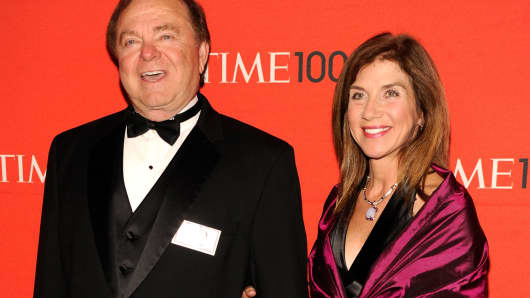Divorces are usually private matters – unless they involved billionaires and public shares.
Despite their best efforts to keep it under wraps, the split between Continental Resources CEO Harold Hamm and his wife, Sue Ann Hamm, has burst into the public eye. After Reuters broke the news yesterday on the pending divorce, Continental issued a statement saying that "Harold Hamm has announced that a petition for divorce is pending in the District Court of Oklahoma County. This private matter has not and is not anticipated to have any impact or effect on the Company's business or operations."
Reuters cited a court filing in which Sue Ann Hamm alleges that Harold "was having an affair" that she discovered in 2010.
(Read more: The Most Expensive Divorce Settlements)
While the divorce may no impact the company's operations, the potential impact on the company's shares are less clear. The company's shares slipped about three percent yesterday and are largely unchanged today.
Divorce attorneys and wealth experts say that the Hamm break-up could force a sale of some of the Hamms' shares, especially if the settlement is in the hundreds of millions or billions of dollars.
Hamm's wealth – estimated at more than $11 billion – comes from his 68 percent ownership in Continental. The company's shares have soared in recent years on the boom in oil production from the Bakken fields in the upper Midwest.
It's unclear whether the Hamms, who have been married since 1988, have a prenuptial agreement. Since Sue Ann also had executive roles at the company, she may have a strong claim to the shares and wealth created from Continental.
"When the spouse has a formal role in the company, that can work to her advantage," said Jeffrey D. Fisher, the prominent divorce attorney with Fisher & Bendeck in West Palm Beach, Fla.
The law doesn't require her to get half, although that's possible. Since Oklahoma is an "equitable distribution" state when it comes to divorce, the court will decide what is fair and equitable though not necessarily equal.
If Sue Ann Hamm receives a big settlement, Harold Hamm might be required to sell shares to pay the costs or give her shares – which she might then be able to sell.
Recent divorces involving big shareholders have led to shares sales. When casino magnate Steve Wynn divorced his wife Elaine in 2009, she received about half of the couple's holdings in the company, or about 10 million shares. The agreement required her to receive permission from Steve Wynn before any sale.
But last year, she petitioned to be able to sell the shares.
(Read more: 'Penta-Millionaires' Happier Than Merely Rich)
The divorce last year between Frank McCourt and Jamie McCourt in Los Angeles forced the sale of the couple's largest asset, the Los Angeles Dodgers baseball team, for more than $2 billion. That sale led to further claims from Jamie McCourt after the sale.
"It's not uncommon to see asset sales as part of these types of divorces," Fisher said. "It's not necessary. But if she receives shares as part of the settlement, she may have the right to sell them for liquidity."



